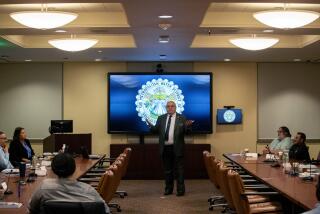CALABASAS : EPA Audit Criticized by Water Officials
Outraged over what they feel is a frivolous and costly search, Las Virgenes Municipal Water District officials are asking the U. S. Environmental Protection Agency to call off auditors who are demanding justification for $5 million spent 15 years ago.
But the EPA, which regularly reviews how its grants are spent, rarely cancels audits, which can be used as the basis for demanding return of money found to have been unwisely spent, said Henry Yamanaka, chief of construction audits for the state controller’s office.
A preliminary study by the controller’s office questioned expenses related to $5 million of $20 million in federal funds granted by the State Water Resources Control Board in 1978, for the construction of the Tapia Water Reclamation and Rancho Las Virgenes Composting facilities.
But district Director of Planning and Engineering James Colbaugh said that most of those outlays were approved by the state board at the time, and that the EPA auditors are second-guessing decisions too long after the fact.
“Now is a fine time for them to tell us they want us to justify everything we did back then,” Colbaugh said. “We’ve got boxes in the back warehouse that people are trying to dust off and go through . . . because now we’re guilty until proven innocent on this.”
Expenditures that cannot be justified must be repaid to the EPA, although there are many opportunities for appeal. But the process of researching the reasons that decisions were made, and the appeals themselves, can sometimes cost more than the reimbursements are worth, Colbaugh said.
Earlier this month, the water district board sent letters to local city councils and the area’s representatives to the state Legislature and Congress, asking them to write letters to the EPA in support of dropping the audit demands.
The expenditures questioned include the hiring of a construction management firm in the late 1970s and the design of Tapia’s sludge treatment system, Colbaugh said.
“What the district is complaining about--the lag time and the costs involved--are part of the normal process,” said Sandra Salazar, spokeswoman for the state water board.
More to Read
Sign up for Essential California
The most important California stories and recommendations in your inbox every morning.
You may occasionally receive promotional content from the Los Angeles Times.









